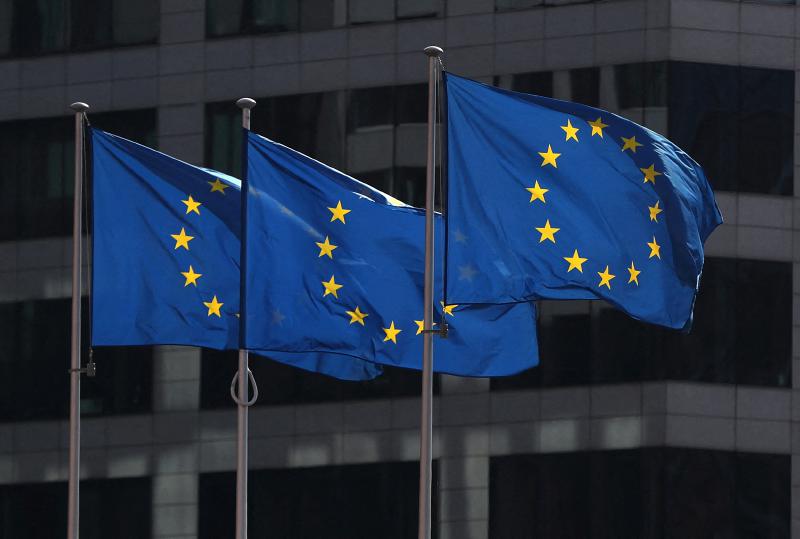
European Union flags fly outside the European Commission headquarters in Brussels
18:09 JST, April 11, 2022
LUXEMBOURG (Reuters) – The European Union’s executive is drafting proposals for a possible EU oil embargo on Russia, the
foreign ministers of Ireland, Lithuania and the Netherlands said on Monday, although there is still no agreement to ban Russian crude.
They are now working on ensuring that oil is part of the next sanctions package, Irish Foreign Minister Simon Coveney said of the
European Commission as he arrived for a meeting with his EU counterparts in Luxembourg.
His Dutch and Lithuanian counterparts also said the European Commission was looking at ways at targeting Russian oil, which makes
up about a quarter of the EU’s crude imports, as a means to pressure Russia to halt the shelling of Ukrainian cities.
We are looking at all other (sanctions), including energy, Dutch Foreign Minister Wopke Hoekstra said.
The European Commission was not immediately available for comment.
Galvanized by what Ukraine says are senseless killings of civilians by Russian troops since Moscow’s Feb. 24 invasion, the bloc last
week approved a fifth round of sanctions on Russia that included an end to Russian coal imports.
Russia has denied targeting civilians in what it calls a “special operation” to demilitarize and “denazify” its southern neighbor.
Any oil embargo rests on both the technical details of the scope and phase-in time of such a move and the support of the EU’s 27
member states. Energy dependence varies widely across the bloc, with countries such as Bulgaria almost totally dependent on Russia
oil. Hungary has said it cannot support an oil embargo.
Germany’s position, as the EU’s biggest economy, will be crucial. Foreign Minister Annalena Baerbock, arriving in Luxembourg, called
for a “coordinated plan to completely phase out fossil fuels” from Russia, but EU diplomats have said Berlin is not actively supporting
an immediate embargo.
The United States and Britain have banned Russian oil, hoping to cut off a significant source of revenue for Moscow. The decision is
harder for Europe’s economy due to its dependency and could push up already high energy prices.
Top Articles in News Services
-

Arctic Sees Unprecedented Heat as Climate Impacts Cascade
-

Prudential Life Expected to Face Inspection over Fraud
-

South Korea Prosecutor Seeks Death Penalty for Ex-President Yoon over Martial Law (Update)
-

Trump Names Former Federal Reserve Governor Warsh as the Next Fed Chair, Replacing Powell
-

Japan’s Nagasaki, Okinawa Make N.Y. Times’ 52 Places to Go in 2026
JN ACCESS RANKING
-

Univ. in Japan, Tokyo-Based Startup to Develop Satellite for Disaster Prevention Measures, Bears
-

JAL, ANA Cancel Flights During 3-day Holiday Weekend due to Blizzard
-

China Confirmed to Be Operating Drilling Vessel Near Japan-China Median Line
-

China Eyes Rare Earth Foothold in Malaysia to Maintain Dominance, Counter Japan, U.S.
-

Japan Institute to Use Domestic Commercial Optical Lattice Clock to Set Japan Standard Time

























